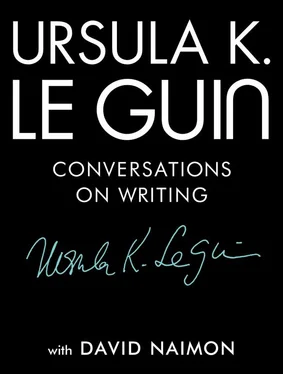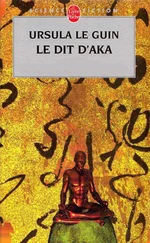DN:Well, here at your house, during this conversation, another author has been coming in and out of the room. Your cat Pard has a new book out himself. Tell us a little bit about Pard’s nonfiction.
UKL:[Laughs.] I shamelessly—and really there’s a shamelessness to it—pretended I was Pard and wrote his autobiography. I say shameless because what I think and feel is immensely different than what Pard thinks and feels. I humanized him completely. But I hope it’s not what is called colonialism. I hope I am not just co-opting Pard. I have a great deal of respect for him. I attempted to share with others what I do understand, or can guess, about his feelings. And no more than that. This whole thing about writing about the other—animals are just the tip of the iceberg.
DN:Speaking of that, you bring up a book, T. H. White’s The Sword in the Stone , as an important book, and it was one that was hugely important to me growing up. Mainly because of the different animals Merlin turns the future King Arthur into as part of his education.
UKL:Arthur gets to be all kinds of creatures—a hawk, a hedgehog—even a rock. It is absolutely wonderful. It had a deep, permanent effect on me, too. Unfortunately, when White incorporated The Sword in the Stone into The Once and Future King , he left out some of the very best of it—cut marvelous, mystical things, added political rants. Most people who know both think it was a mistake, and you should get the old book if you can find it.
DN:Later you say, “We human beings have made a world reduced to ourselves and our artifacts but we aren’t made for it.” This feels kind of like a tragic horror story of sorts, that we’ve created a world and then a literature about that world that we are ill-suited to, one that references only ourselves.
UKL:We are suited to live in it, but it is such a small part of the world we could be living in. Let’s put it that way. It makes it less of a horror story and more of an existential mistake.
DN:Taking that a step further, I wonder if the resistance to considering fantasy or science fiction as literature is partly because of the elevation of the non-human in it, of the decentralization of humanity with regard to intelligence or otherwise.
UKL:You are right on it there. There is real resistance to this. And this is behind a lot of the resistance to science. Because science—not just Copernicus, most science—moves us away from the center of things. Because we aren’t. You find out how unimaginably old the Earth is and you feel sort of dethroned. Many people can’t bear it. They hate it. It makes them feel alienated. That’s the pity of it. If they could get into it, science could give them a much deeper sense of identification with all these marvelous processes that are going on all around us all the time, that we are part of. All of us.
DN:You write a lot about gender, sexism, feminism, and gendered literature in this collection and there is a talk you gave at the Winter Fishtrap, the gathering in Joseph, Oregon, called: “What Women Know,” where you resist making a cult of women’s knowledge, of associating women with the instinctual, with nature, with the dark, because it reinforces the masculinist idea of women as more primitive. Reading this I felt a subtextual conversation going on between “What Women Know” and “The Beast in the Book.” Together they seem like a call both to bring the nonhuman other, to bring nature and animals back into literature but also to decouple the idea that the realm of nature is the realm of women. Instead you imagine a world where men spend some time in the darkness that they avoid and women up in the light, that women claim their rightful place in the world of reason and ideas and action too. I’d love for you to unpack this a little more for us, your interrogation of the gendered nature of nature.
UKL:I suppose it comes down in some ways to the brute and simple fact that a woman conceives, carries a child, and bears it. Women can perform this enormous natural act that men can’t. So how much of this is male compensation? How much of a lot of human behavior is male compensation, claiming generative power as the only power, and calling any other power or ability inferior? That is a theme that goes through a lot of my writing, because it goes through a lot of our lives.
DN:In a previous conversation we talked about the erasure of women writers from the canon, or women not being considered for the canon in the first place. We talked about Grace Paley as one example since she passed away, and also about C. J. Cherryh in relation to William Gibson, how they were both winning awards at the same time, both seeming to shape the conversation of the moment, but flash forward a couple of decades and everyone knows who William Gibson is and far fewer people have even heard of Cherryh. So I was happy to see your essay in Words Are My Matter called “Disappearing Grandmothers,” where you enumerate four ways women are erased from the canon, or diminished in the conversation of literature: denigration, omission, exception, and disappearance.
You took the title “Disappearing Grandmothers” from a letter of Wallace Stegner’s. The story you relate about Wallace Stegner, and what he did to the writer Mary Foote, was quite a shocking tale, and an egregious example of the disappearance of a woman writer.
FROM
“Disappearing Grandmothers”
• • •
Exception
A novel by a man is very seldom discussed with any reference to the author’s gender. A novel by a woman is very frequently discussed with reference to her gender. The norm is male. The woman is an exception to the norm, from which she is excluded.
Exception and exclusion are practiced both in criticism and in reviewing. A critic forced to admit that, say, Virginia Woolf is a great English novelist may take pains to show her as an exception—a wonderful fluke. Techniques of exception and exclusion are manifold. The woman writer is found not to be in the “mainstream” of English novels; her writing is “unique” but has no influence on later writers; she is the object of a “cult”; she is a (charming, elegant, poignant, sensitive, fragile) hothouse flower that should not be seen as competing with the (rugged, powerful, masterful) vigor of the male novelist.
Joyce was almost instantly canonized; Woolf was either excluded from the canon or admitted grudgingly and with reservations for decades. It is quite arguable that To the Lighthouse , with its subtle and effective narrative techniques and devices, has been far more influential on later novel-writing than Ulysses , which is a monumental dead end. Joyce, choosing “silence, exile, cunning,” led a sheltered life, taking responsibility for nothing but his own writing and career. Woolf led a fully engaged life in her own country in an extraordinary circle of intellectually, sexually, and politically active people; and she knew, read, reviewed, and published other authors all her grown life. Joyce is the fragile person, Woolf the tough one; Joyce is the cult object and the fluke, Woolf the continuously fertile influence, central to the twentieth-century novel.
But centrality is the last thing accorded a woman by the canoneers. Women must be left on the margins.
Even when a woman novelist is admitted to be a first-rate artist, the techniques of exclusion still operate. Jane Austen is vastly admired, yet she is less often considered as an exemplar than as unique, inimitable—a wonderful fluke. She cannot be disappeared; but she is not fully included.
Читать дальше









